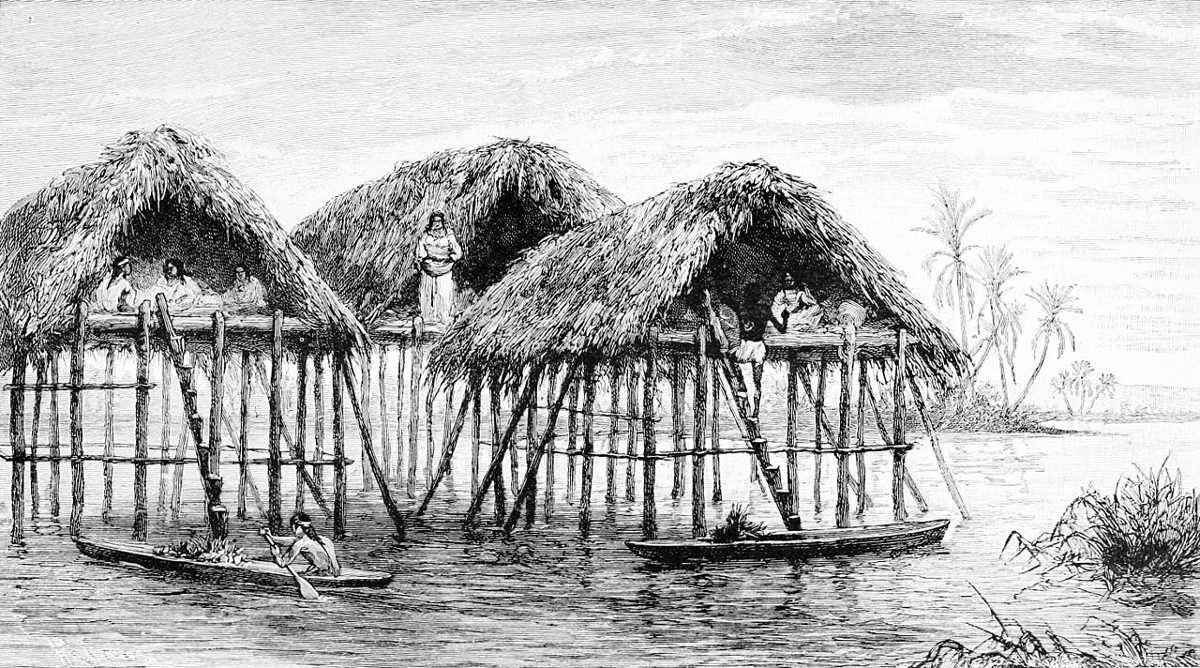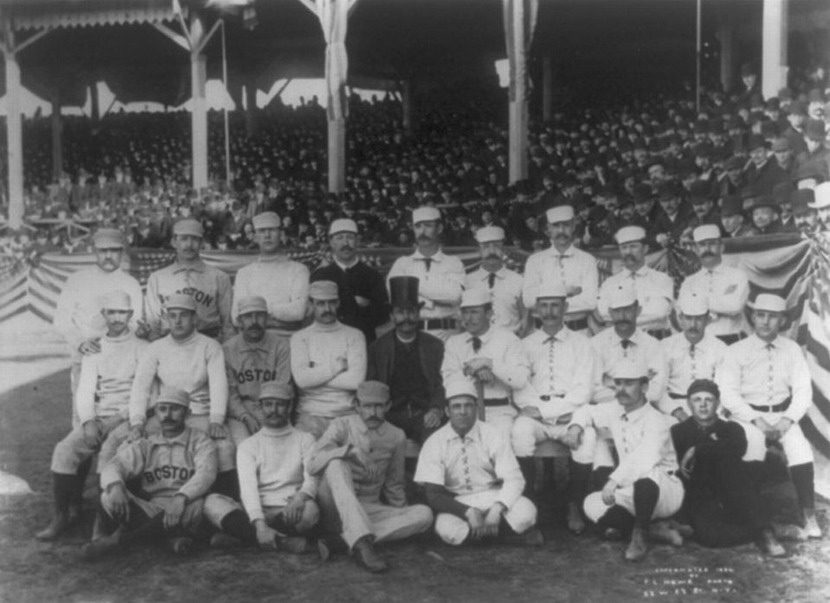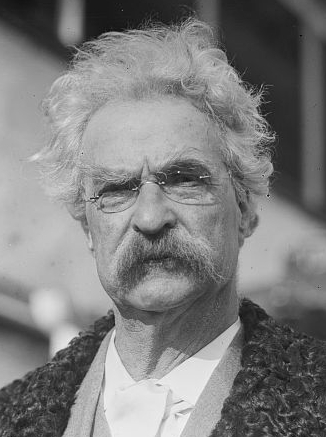
Venezuela means “little Venice.”
The stilt houses of Lake Maracaibo reminded Amerigo Vespucci of the Italian city, so he named it accordingly.

Venezuela means “little Venice.”
The stilt houses of Lake Maracaibo reminded Amerigo Vespucci of the Italian city, so he named it accordingly.

Composition 1960 #5, by avant-garde composer La Monte Young:
Turn a butterfly (or any number of butterflies) loose in the performance area.
When the composition is over, be sure to allow the butterfly to fly away outside.
The composition may be any length, but if an unlimited amount of time is available, the doors and windows may be opened before the butterfly is turned loose and the composition may be considered finished when the butterfly flies away.
“I felt certain the butterfly made sounds,” Young wrote, “not only with the motion of its wings but also with the functioning of its body … and unless one was going to dictate how loud or soft the sounds had to be before they could be allowed into the realm of music … the butterfly piece was music.”
In Visible Deeds of Music (2002), Simon Shaw-Miller writes, “An insect recognized as of great beauty, often understood as a symbol of transformation in art, is here the instrument itself. Its flight acts as a visual metaphor for the absent melody, or inaudible sound; Young is reported to have said to his colleague Tony Conrad, ‘Isn’t it wonderful if someone listens to something he is ordinarily supposed to look at?'”

Mathematicians Steve Humble and Yutaka Nishiyama invented this game to highlight a surprising result in probability, based on a principle discovered by Walter Penney.
Two players play the game using an ordinary deck of cards. The cards will be dealt out in a row, one after another. Before the dealing begins, each player claims an ordered sequence of colors that might turn up, for example “red black red” (RBR) or “black red red” (BRR). As the cards are dealt, if three successive cards turn up in one of these sequences, the player who claimed it gets to collect those three cards as a trick, and the dealing continues. When all 52 cards have been dealt, the player who has collected the most tricks wins. (In a typical game, 7 to 9 tricks are won.)
This sounds like a perfectly even game, but in fact the second player has a strategy that will given him a significant advantage. When the first player has chosen his sequence (say, RRB), the second player changes the middle color, adds it to the start of the sequence, discards the last color, and claims the resulting sequence (in this case, BRR). This gives a decided advantage to the second player no matter which sequence his opponent has chosen. In a computer simulation of 1,000 games, Humble and Nishiyama got these results:
BBB vs RBB – RBB wins 995 times, 4 draws, BBB wins once
BBR vs RBB – RBB wins 930 times, 40 draws, BBR wins 30 times
BRB vs BBR – BBR wins 805 times, 79 draws, RBR wins 116 times
RBB vs RRB – RRB wins 890 times, 68 draws, RBB wins 42 times
BRR vs BBR – BBR wins 872 times, 65 draws, BRR wins 63 times
RBR vs RRB – RRB wins 792 times, 85 draws, RBR wins 123 times
RRB vs BRR – BRR wins 922 times, 51 draws, RRB wins 27 times
RRR vs BRR – BRR wins 988 times, 6 draws, RRR wins 6 times
Penney’s original game uses coin flips; cards are preferable because no record-keeping is required and because the finite number of cards in a deck increases the second player’s chances.
(Steve Humble and Yutaka Nishiyama, “Humble-Nishiyama Randomness Game — A New Variation on Penney’s Coin Game,” Mathematics Today, August 2010.)
Austrian mechanical engineer Gernot Zippe invented the Zippe-type centrifuge.
In Hebrew, his name (גרנוט ציפה), is an anagram of the word “centrifuge” (צנטריפוגה).

Maybe this was inevitable: A team of mathematicians have worked out the most efficient pub crawl in the United Kingdom, connecting 24,727 pubs in the shortest possible closed loop, 45,495,239 meters, or about 28,269 miles. Because it’s a loop, a determined crawler can start at any point and eventually find himself back home.
Despite the pickled application, this represents a serious achievement in computational mathematics, an advance in the so-called traveling salesman problem (TSP), which asks for the shortest route that passes through each of a set of points once and once only. The pub crawl includes more than 100 times the previous record number of stops in a road-distance TSP.
“We, of course, did not have in mind to bring everything mathematics has to bear in order to improve the lot of a wandering pub aficionado,” wrote lead researcher William Cook of the University of Waterloo. “The world has limited resources and the aim of the applied mathematics fields of mathematical optimisation and operations research is to create tools to help us to use these resources as efficiently as possible.”
(Thanks, Danesh.)

Here are the Boston Beaneaters and the New York Giants on opening day 1886.
Tempers must have been running high that day — pitcher Old Hoss Radbourn (back row, far left) is giving the finger to the cameraman, the first known photograph of the gesture.

In Languages and Their Speakers (1979), linguist Timothy Shopen shows how greetings and leave-takings can reflect a society’s cultural values. First he gives a typical American conversation in which one friend encounters another who is 15 minutes late for work:
Hello Ed!
— Hi! How are you?
Sorry, I’m in a hurry.
— Yeah, me too.
See you on Saturday.
The whole interaction lasts five seconds; it includes a greeting and a leave-taking, but there is no actual conversation between. Here’s the same interaction in the Maninka culture of West Africa:
Ah Sedou, you and the morning.
— Excellent. You and the morning.
Did you sleep in peace?
— Only peace.
Are the people of the household well?
— There is no trouble.
Are you well?
— Peace, praise Allah. Did you sleep well?
Praise Allah. You Kanté.
— Excellent. You Diarra.
Excellent.
— And the family?
I thank Allah. Is there peace?
— We are here.
How is your mother?
— No trouble.
And your cousin Fanta?
— Only peace. And your father?
Praise Allah. He greets you.
— Tell him I have heard it.
And your younger brother Amadou?
— He is well. And your uncle Sidi?
No trouble, Praise Allah …
Where are you going?
— I’m going to the market. And you?
My boss is waiting for me.
— O.K. then, I’ll see you later.
Yes, I’ll see you later. Greet the people of the household.
— They will hear it. Greet your father.
He will hear it.
— May your day pass well.
Amen. May the market go well.
— Amen. May we meet soon.
May that “soon” arrive in good stead.
“Time elapsed: 46 seconds,” Shopen writes. “It is more important to show respect for a friend or a kinsman than to be on time for work, and thus we have the example of Mamadou Diarra above, already fifteen minutes late for work and not hesitating to be even later in order to greet a friend in the proper manner. First things first, and there is no question for the Maninka people about what is most important.”

After his daughter Jean’s death in 1909, Mark Twain began to write:
Would I bring her back to life if I could do it? I would not. If a word would do it, I would beg for strength to withhold the word. And I would have the strength; I am sure of it. In her loss I am almost bankrupt, and my life is a bitterness, but I am content: for she has been enriched with the most precious of all gifts — that gift which makes all other gifts mean and poor — death. I have never wanted any released friend of mine restored to life since I reached manhood. I felt in this way when Susy passed away; and later my wife, and later Mr. Rogers. When Clara met me at the station in New York and told me Mr. Rogers had died suddenly that morning, my thought was, Oh, favorite of fortune — fortunate all his long and lovely life — fortunate to his latest moment! The reporters said there were tears of sorrow in my eyes. True — but they were for ME, not for him. He had suffered no loss. All the fortunes he had ever made before were poverty compared with this one.
“I am setting it down,” he told his friend Albert Bigelow Paine, “everything. It is a relief to me to write it. It furnishes me an excuse for thinking.”
He wrote for three days, handed the manuscript to Paine, and told him to make it the final chapter of his autobiography. Four months later he was dead.

Reader Alex Freuman passed this along — a simple method of establishing any row in Pascal’s triangle, attributed to Edric Cane. To establish, for example, the seventh row (after the initial solitary 1), create a row of fractions in which the numerators are 7, 6, 5, 4, 3, 2, 1 and the denominators are 1, 2, 3, 4, 5, 6, 7:
Now multiply these in sequence, cumulatively, to get the numbers for the seventh row of the triangle:
These are the coefficients for
.
Cane writes, “It couldn’t be easier to remember or to implement.” Another example — row 10:

obtest
v. to call heaven to witness; to protest against
proditor
n. a traitor; a betrayer
Is a union breaking the law if it posts a giant inflatable rat outside an employer’s facility? No, it’s not, according to a 2011 decision by the National Labor Relations Board. The Sheet Metal Workers’ Union had sought to dissuade a hospital from using non-union workers by stationing a 16-foot rat near the building’s entrance. The NLRB held that the “the use of the stationary Giant Rat (i) constituted peaceful and constitutionally protectable expression, (ii) did not involve confrontational conduct that would qualify as unlawful picketing, and (iii) did not qualify as nonpicketing conduct that was otherwise unlawfully coercive.”
The “rat collosi” are multiplying (gallery). Let’s hope they don’t stage an uprising themselves someday.